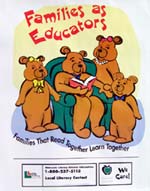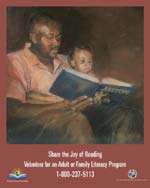 Free Resources Available to Order for Florida Educators |
Florida’s
Adult and Family Literacy Resource Center Information Clearinghouse An Initiative of the Florida Literacy Coalition |
| Posters |
| Flyers |
| Bilingual Clip Sheets |
| Brochures |
| Bookmarks |
| Books |
| Booklets |
| CD-ROM |
| Miscellany |
| Order Form |
|
|
| Posters | |
|
|
“50
Ways to Help Fight Illiteracy” |
| “Family
of Bears” This poster promotes family literacy by emphasizing the role that families play as educators. It states: “Families that Read Together Learn Together.” The bottom of the poster features the Florida Literacy Hotline. The design of this poster mirrors the layout of our family literacy bookmark. Size: 24” x 30” POS004 see enlargement |
|
| “Share
the Joy of Reading” Featuring artwork by Sharon Wilson, this poster features a man reading to a young child. This image, bordered with a burgundy frame, promotes the recruitment of volunteers for adult and family literacy programs and prominently includes the Florida Literacy Hotline. Size: 24” x 36” POS 005 see enlargement |
|
| “Teach
the World to Read” This colorful poster features an open book highlighting a popup cityscape. It promotes our hotline as a source for potential literacy volunteers and measures 24” x 12”. POS006 see enlargement return to top |
|
| Flyers | |
 |
“It’s
Never Too Late to Learn” This colorful flyer encourages potential literacy students to call the Florida Literacy Hotline to discover more about free classes and tutoring programs. It also features the Coalition’s website address and several images of adult learner settings. 8.5" x 11" FLY001 11 x 14 FLY002 Spanish FLY003 see enlargement |
| “50
Ways to Recognize a Volunteer” This flyer lists a variety of ways to acknowledge the effort and commitment that volunteers make to literacy programs from simply saying “thank you” to creating volunteer awards. FLY004 |
|
| “The
Value of Volunteers” This flyer illustrates the impact that volunteer efforts have in their community by listing the volume of volunteers in the United States and the value of their commitments. This flyer is a valuable reminder of the incredible impact volunteers have on their community. FLY005 return to top |
|
| Bilingual Clip Sheets |
| The BOCES Geneseo Migrant Center has developed a number of clipsheets featuring important informational topics for recent immigrants and adult learners. These sheets are available in English and Spanish and are written for low-level readers. Sheets in the following topics are available:
|
| Brochures |
| “Florida’s
Adult Literacy Resource Centers: Supporting Literacy Throughout
the State” “Florida
Literacy Coalition: Florida’s Adult Literacy Resource Center” “Family
Literacy” “Looking
for Literacy? LINCS” |
| Bookmarks | |
 |
“Celebrating
Volunteers in Literacy” This bookmark feature Hagar the Horrible and promotes the Florida Literacy Hotline as a resource for literacy volunteers throughout Florida. BKM 001 see enlargement |
| “Hotline
Bookmark” Our hotline bookmark prominently features the Florida Literacy Hotline along with the FLC logo and highlights our statewide listings for free or low-cost classes and tutoring in reading, writing, math, English Language, GED Preparation and Family Literacy. BKM002 see enlargement |
|
 |
“Family
of Bears” This bookmark promotes family literacy by emphasizing the role that families play as educators. It states: “Families that Read Together Learn Together.” The reverse of the bookmark features the Florida Literacy Hotline and lists key components of Family Literacy. The layout of this bookmark mirrors the design of our family literacy poster. BKM 003 see enlargement return to top |
| Books |
| Family
Literacy Program Quality Self-Study Teaching
Our Youngest: A guide for preschool teachers and child care providers National
Dissemination Center for Children with Disabilities (NICHCY) News
Digest Vol. 25. Helping
Your Child Learn Mathematics Promising
Practices: What We Learned as Pilot Programs Research-Based
Principles for Adult Basic Education Reading Instruction From
the Classroom to City Hall: a guide to Learner Leadership at the
Local Level Florida
Literacy Data and Statistics Reference Guide |
| Booklets |
| Adult
and Family Literacy: Preparing Florida for the Future “Literacy
News” Reading
Takes You Places! A guide for grown-ups and kids Keep
Your Food Safe Protecting
Your Child Against Serious Diseases: Making Sure Kids Get All
Their 'Shots' Use
Medicine Safely |
| CD-ROM |
| NIFL’s
LINCS to Literacy: an interactive tutorial for finding Adult Education
and Family Literacy Resources Listening
Review for ESOL |
| MISCELLANY |
| Referral
Pads |
Our thanks to the Florida Department of Education, Division of Community Colleges and
Workforce Education for generously supporting the programs of the Center.
Florida Literacy Coalition, Inc. Florida's Adult and Family Literacy Resource Center
934 N. Magnolia Ave. Suite 104 Orlando, FL 32803 • (407) 246-7110 • Hotline: 1-800-237-5113
www.floridaliteracy.org


